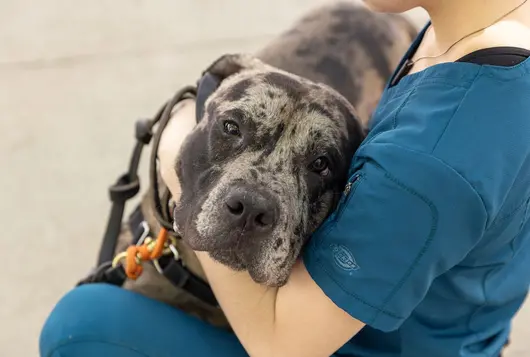Paintball Ingestions and Treatment Options

While most paintball enthusiasts play at specially-designed facilities, backyard events have become more and more popular, meaning more animals are exposed to the game's dye-filled gelatin capsules.
Paintballs are comprised of several ingredients including polyethylene glycol, gelatin, sorbitol, glycerol, dye and/or vegetable oil. Vegetable oil is attractive to many dogs and the other ingredients give paintballs a sweet taste, thereby increasing the risks of ingestion.
Symptoms
A dog may ingest intact paintballs or lick remnants after rupture, and common signs include vomiting and ataxia. Tremors, diarrhea and hypernatremia are also reported frequently. Rarely, acidosis and seizures are seen.
Signs may develop as quickly as 30 minutes after ingestion but can take up to several hours to develop. Ingestion of greater than one paintball per 10 pounds of dog can potentially be a problem, and because containers often contain a large number of paintballs, large ingestions are not uncommon.
The mechanism of action of hypernatremia in these cases is due to osmotic shifts of interstitial fluid into the GI tract and free water loss. Most of the ingredients in paintballs (PEG, sorbitol, glycerol) are osmotically active.
Treatment
Inducing emesis should be considered in a patient who has ingested more than one paintball per 10 pounds of body weight and is not already vomiting. Since activated charcoal contains sorbitol and is known to cause hypernatremia, it should not be given in cases of paintball ingestions.
Once signs develop, treatment is symptomatic and supportive. Vomiting may be managed with an anti-emetic and electrolytes should be monitored closely, particularly in the several hours immediately following a paintball ingestion.
Fluid therapy is key in these cases and fluids should be used to correct dehydration secondary to gastrointestinal losses and to correct hypernatremia. As these are acute hypernatremia cases, the sodium can be dropped quickly without the worry of cerebral edema occurring.
If the patient doesn’t present for more than 24 hours post exposure, those cases need to be managed as chronic hypernatremia cases (drop sodium very slowly). Warm-water enemas may also help aid in providing free water in severe cases of acute hypernatremia. Diazepam or other common anti-seizure medications may be used to control seizures.
Other supportive care, such as correction of acidosis and thermoregulation, should be provided as needed.
Most dogs recover from paintball ingestions within 24-48 hours or once electrolyte abnormalities are corrected. Treatment is guarded if the animal has been seizing for an extended period of time.
We have lots more on this subject:




